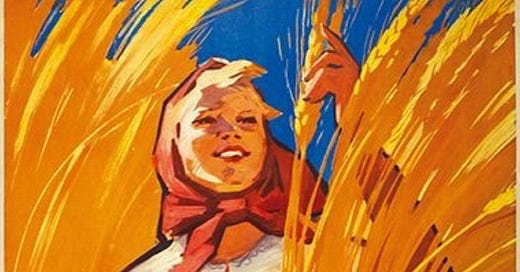I’ve written a little bit about the 1930s famine in Ukraine — now known to many as the Holodomor — because I recently realized that it likely played a role in my family history. The famine was probably why my grandmother and family fled their shtetl in 1933 and headed to Crimea — only to then quickly move on to Leningrad, which is where the factory jobs were. Leningrad is where my mother was then born and where I was born, too.
I had never given it much thought until I dug into my own family history and the history of Jews in Soviet Ukraine, but I guess I shouldn’t have been that surprised to learn that Jews suffered in a big way during the famine. They were a major minority in those lands and so they suffered along with Ukrainian peasants and everyone else who happened to live there, including minority groups like the Roma. But that’s not the story you get when you learn about the Holodomor these days. There’s been a big decades-long push by a Ukrainian nationalist diaspora, backed up by the usual anti-communist/Cold War interests here, to recast this horrible famine as a “classic” ethnic genocide in the mold of the Holocaust: the famine was meant to wipe out Ukrainians. But for this narrative to work, Jews and other ethnic minorities living in Soviet Ukraine had to be left out of the story — and that’s exactly what’s been happening.
The reason I’m writing about about all this now is that it looks like the German parliament will soon vote on officially recognizing the Holodomor as a genocide.
This is a weird move for a couple of reasons.
First, there’s no consensus on whether or not the famine was unleashed to wipe out ethnic Ukrainians as a people. In fact, as far as I know, all evidence points in the opposite direction: It was not genocide but a result of both political-economic and natural forces. It was a horrible famine — millions died, millions more suffered. And it would not have gotten going on the scale it did if the Soviet Union hadn’t been doing its industrial accelerationism and strong arming and collectivizing agriculture and brutally crushing the peasants who wanted nothing to do with it. That’s all true, and that basically an argument that historians like Stephen Wheatcroft have made. The problem for the genocide claim is that the famine wasn’t just restricted to Ukraine but affected a huge swath of Southern Russia and other Soviet Republics — including an even more deadly collectivization-and-bad-weather famine in Kazakhstan that killed more than a third of the population. In Kazakhstan, communists wanted to quickly transform a pastoral and nomadic society into a one based on centralized and industrialized agriculture. I mean, what could go wrong?
In short, the Soviet famine was widespread — you could almost say, system wide — and not just restricted to Ukraine. Der Spiegel, in a somewhat critical assessment of the push to label the Ukrainian famine a genocide, just published an interview that superficially noted the same thing:
SPIEGEL: According to the UN Convention of the 9th December 1948 an act that was "composed with the intention of destroying a national, ethnic, racial or religious group as such, in whole or in part." However, Stalin's hunger terror was not directed exclusively against the ethnic group of Ukrainians. Millions of other people died, including about 1.5 million Kazakhs.
Penter: This corresponded to more than a third of the Kazakh population. In this respect, the human losses in Kazakhstan were even greater in terms of population than in Ukraine. Hundreds of thousands of people also died in Russia itself. However, the famine there is completely differently anchored in the culture of remembrance - not as Stalin's crime, but as a kind of collateral damage in the industrialization of the country. which later proved to be decisive for winning Nazi Germany in the Second World War.
SPIEGEL: In addition, no direct decree has yet been found in the archives stating that Stalin actually ordered the Ukrainian group to be destroyed.
Penter: Yes, the question of Stalin's intention to extermination has not yet been conclusively clarified. It is controversial whether Stalin's targeted hunger policy was directed against the social group of farmers, whose resistance to collectivization in Ukraine was particularly great…
Second, it’s weird to see the German parliament openly admit to politicizing this genocide resolution.


